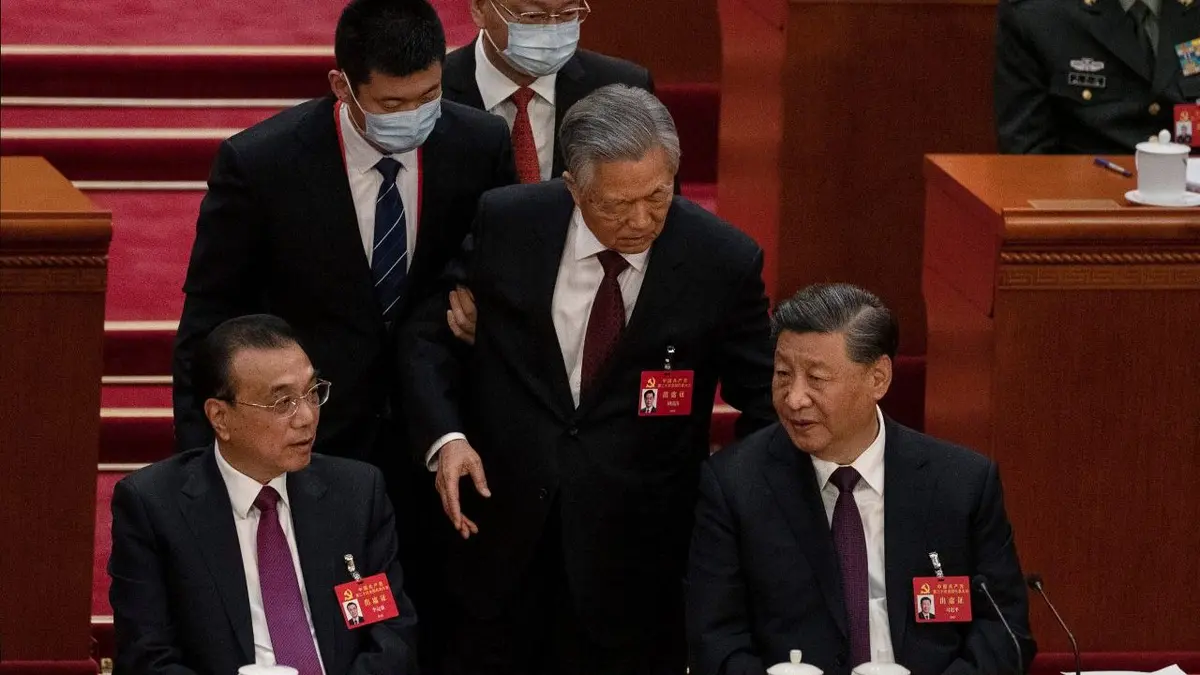US ranked ‘weak’ by military index while China offers money to former UK pilots
Fox News senior strategic analyst Gen. Jack Keane (Ret.) says that China has more military capabilities than the U.S. who needs an ‘effective military deterrence’ to limit Chinese incentives to go to war.
The world is much more dangerous today because of what happened in Beijing this past weekend. The Chinese Communist Party’s (CCP) quinquennial 20th Congress "crowned" Xi Jinping essentially as president and chairman for life by amending the party constitution to enshrine him as the "core" leader which makes him as powerful as founder Mao Zedong, the man who killed up to 100 million Chinese to chart his ideological agenda through decades of Chinese history.
The CCP reinforced Xi’s iron-grip on power by passing a "historical resolution" lauding Xi’s philosophy as the "essence of Chinese culture," which consolidated his power and cleared the path for him to remain in office to push his agenda, which he described last week saying "the great rejuvenation of the Chinese nation has entered an irreversible historical process."
Chairman Xi, 69, emerged from the Congress that ended Saturday evening with more power than ever. Immediately, he stacked his government with staunch Marxist-Leninists sycophants, which strengthens his hold on power and tightens his grip over China’s future to allow him to advance the current trajectory of confrontation across the world.
HUNDREDS OF STATE, LOCAL GOVERNMENT ENTITIES VULNERABLE TO CHINESE ESPIONAGE: REPORT
As a result, Chinese financial markets plummeted as true Marxists took firm control over China’s economy and the sounds of Chinese saber rattling echoed across the world – the East-West Cold War is heating up.

A F16v aircraft flies past an airbase in Hualien, Taiwan, August 18, 2022. (REUTERS/Ann Wang)
I anticipated this day when I wrote my new book, "Kings of the East: China’s Plan to Eliminate America and Impose a Communist World Order." I believe every word of that title and unfortunately the 20th Congress confirmed the worst.
Early in the Congress, Xi revealed in his 104-minute speech his vision for a "new era" of socialism, which he believes will save China. Xi intends to realize his "Chinese Dream," the so-called "great rejuvenation of the Chinese nation," a theme repeated from his 2017 National Congress speech whereby he cast himself as a 21st Century Mao with plans that address "socialist modernization."
After gaining a third term, Xi ensured success for his agenda by stacking the all-powerful Politburo Standing Committee with loyalists like Shanghai party chief Li Qiang, the possible next premier. Further, Xi removed critics from power like former Chinese President Hu Jintao who was unceremoniously escorted out of the Congress’ closing ceremony on Saturday evening.
With Xi firmly ensconced and dissent sidelined – the culmination of a 10-year process – he has a freer hand to make controversial decisions in both domestic and foreign policy. Xi’s third term will return China to strongman rule, much like the model adopted by Mao. These actions were predictable because Xi has slowly removed rivals and forced the end to presidential term limits.
Domestically, Xi will ramp up his society-wide ideological programs and further crackdown on CCP corruption, overseeing "a new chapter in a modern Marxism" for China’s future. Understand that Xi is an ideological man, a Marxist-Leninist nationalist. He was initially hired by CCP elite to reassert the party’s Leninist control and rid the regime of the rip-roaring days of unconstrained "reform and opening" to develop the economy.
Word that Marxists were changing economic course sent Chinese markets into a tailspin. On Monday, October 24, the Hong Kong stock market "had its worst day since the 2008 global financial crisis." In fact, two of China’s leading tech giants, Alibaba and TenCent, plummeted more than 11 percent, wiping out $54 billion in their market caps.
Xi’s promised economic course correction created quite a stir beyond the markets. He told Congress that he would reduce the debt in the troubled real estate sector and attack wealth inequality – what he called a "common prosperity." Further, he de-emphasized economic growth and called for more state direction and control. He also aims to bring about "the increased internationalizing of the Renminbi," China’s official currency, a move to decouple China from international dependency on global financial markets, currently dominated by the U.S. dollar.
On foreign affairs, expect Xi to accelerate his attacks against western "hegemons" which he claims aim to prevent China’s rise. Xi isn’t likely to shy away from open conflict with the U.S., a reflection of his view restated at the Congress that "the East [China] is rising while the West [the U.S.] is declining."

BEIJING, CHINA - OCTOBER 22: Chinese President Xi Jinping and Premier Li Keqiang, left, look on as former President Hu Jintao, centre, speaks to Xi as he is helped to leave early from the closing session of the 20th National Congress of the Communist Party of China, at The Great Hall of People on October 22, 2022 in Beijing, China's Communist Party Congress is concluding today with incumbent President Xi Jinping expected to seal a third term in power. (Photo by Kevin Frayer/Getty Images) (Photo by Kevin Frayer/Getty Images)
Chairman Xi warned of "drastic changes" on the international front, including "external attempts to blackmail, contain, blockade, and exert maximum pressure" on China, lessons from the ongoing Ukraine war. This suggests we are entering a period of systemic rivalry or new Cold War, marked by more Chinese assertiveness, more overt ideological hostility, and more counter-coalition building much like the old Cold War with the Soviet Union.
Expect that Xi will strengthen ties with other authoritarians like Russia’s President Vladimir Putin. This outcome reflects the global conflict between "democracies and autocracies," something the Biden administration calls out in the new National Security Strategy.
Xi made clear to the Congress that he no longer rules out a major war in the future. He said the CCP must be "prepared for dangers in peacetime" as well as "preparing for the storm." He called on the CCP to adhere to "the spirit of struggle" and said the next five years are "critical" for the continued building of a powerful Chinese nation.
CLICK HERE TO GET THE OPINION NEWSLETTER
The self-ruled nation of Taiwan received special mention at the Congress. The loudest ovation came when Xi vowed to "reunify" the mainland with Taiwan. China would "strive for peaceful reunification," Xi said. However, he warned that Beijing would "never promise to renounce the use of force" and "complete reunification of our country must be realized."
More broadly, the latest Pentagon report on China indicates that Xi intends to transform the People’s Liberation Army – China’s armed forces – into a "world class" military by 2049. Already, China has the world’s largest navy, army and is expected to field more than 1,000 deliverable nuclear warheads by the end of this decade.
CLICK HERE TO GET THE FOX NEWS APP
A "world class" military is key to Xi’s aim to create a new world order. "The PRC [People’s Republic of China] is increasingly clear in its ambitions and intentions. Beijing seeks to reshape the international order to better align with its authoritarian system and national interests, as a vital component of its strategy to achieve the ‘great rejuvenation of the Chinese nation," states the Pentagon report.
The CCP granted Chairman Xi an unprecedented third term and more power. Expect him to push his Marxist-Leninist worldview at home and across the globe, upsetting financial markets and making the world more dangerous than just a week ago.






















